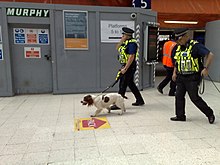Working dog



A working dog is a dog used to perform practical tasks, as opposed to pet or companion dogs.
Definitions vary on what a working dog is, they are sometimes described as any dog trained for and employed in meaningful work; other times as any dog whose breed heritage or physical characteristics lend itself to working irrespective of an individual animal's training or employment; and other times again it is used as a synonym for herding dog.[1][2][3]
Working dog types
[edit]
Roles performed by dogs that sometimes sees them classified as working dogs include:
- Assistance or service dog[4] trained to help a disabled person in some way, such as guiding a visually impaired person, providing mobility assistance, and psychiatric service. Often overlap with Therapy dog[4] used to provide companionship or to help people rehabilitate from injuries.
- Carriage dog[5] historically used to provide protection to carriage passengers or merchandise
- Detection dog[4] or sniffer dog, trained to detect for example drugs or land mines.
- Drafting dog[6] traditionally used to pull dog carts. Now survive in modern age as a novelty or in Carting sport.
- Guard dog[6] used to protect buildings or livestock
- Herding dog[6]
- Hunting dog used to hunt wildlife or assist hunters. Are split into several varieties, including hounds, terriers, dachshunds, cur type dogs, catch dogs, bay dogs, or gun dogs.
- Military working dog[7] trained in combat, or used scouts, sentries, messengers, mercy dogs, and trackers
- Search and rescue dog[4]
- Sled dog[8]
- Working terrier is a terrier bred to hunt small mammals, such as a badger, fox and rat.[9]
Working dogs in Australia
[edit]
Working dogs are known as an Australian icon. They are prevalent in Australia due to the large agricultural industry. Working dogs can be seen herding cattle or sheep and are also used to guard poultry from foxes and cats. A report in 2019 stated that there were over 270,000 stock herding dogs in Australia.[10] Some popular breeds for farm work include Border Collies, Kelpies, Maremmas and Australian Cattle Dogs.
Events to showcase the skills of working dogs are held through Australia alongside key local festivals and events. Trials and performances include high jumps, sheepdog speed trials and sled or weighted pulls.[11]
Kennel club classification
[edit]
When competing in conformation shows, a number of kennel clubs classify various pedigree dog breeds into a "working group" or "working dogs group", although it varies between kennel club what breeds are so classified. The Kennel Club classifies mastiff, pinscher, sled dog, select livestock guardian dog and some other breeds in their working group.[12] The American Kennel Club's working group and the Canadian Kennel Club's working dogs group are very similar to The Kennel Club's except they include all livestock guardian dog breeds and all full sized spitz breeds (not just sled dogs) recognised by the clubs.[13][14] Both the Australian National Kennel Council's and New Zealand Kennel Club's working dogs groups comprise herding dog breeds and select livestock guardian dog breeds recognised by those clubs.[15][16] The Fédération cynologique internationale has no working group.[17]
See also
[edit]- Seizure response dog – Assists person during or immediately before or after a seizure
- Working animal – Domesticated animals for assisting people
- Mojee
References
[edit]- ^ "working dog". Collins Dictionary. HarperCollins Publishers L.L.C. 2020. Retrieved 21 January 2020.
a dog of suitable breed or training kept for its practical use, such as herding sheep, rather than as a pet or for showing
- ^ "working dog". Merriam-Webster. 2019. Retrieved 21 January 2020.
a dog suitable by size, breeding, or training for useful work (such as draft or herding) especially as distinguished from one suitable primarily for pet, show, or sporting use
- ^ "working dog". Lexico. Oxford University Press. 2019. Archived from the original on January 26, 2020. Retrieved 21 January 2020.
A dog trained to work with livestock.
- ^ a b c d Olson, Patricia N. (1 August 2002). "The modern working dog—a call for interdisciplinary collaboration" (PDF). Journal of the American Veterinary Medical Association. 221 (3): 352–355. doi:10.2460/javma.2002.221.352. PMID 12164529. Archived from the original (PDF) on 26 January 2020. Retrieved 22 January 2020.
- ^ "British Carriage Dog Society". 2018-01-29. Archived from the original on 29 January 2018. Retrieved 2022-04-11.
- ^ a b c "Working dog". Encyclopædia Britannica. Encyclopædia Britannica, Inc. 2019. Retrieved 21 January 2020.
any of various breeds of dog bred as guard, herding, draft, or rescue animals.
- ^ Rogak, Lisa (2011). The dogs of war: the courage, love and loyalty of military working dogs. New York: Thomas Dunne Books. ISBN 9781250008817.
- ^ Coppinger, Raymond; Schneider, Richard (1995). "Evolution of working dogs". In Serpell, James (ed.). The domestic dog: its evolution, behaviour and interactions with people. Cambridge: Cambridge University Press. pp. 21–50. ISBN 0521425379.
- ^ Glover, John. (2014). Ratting With Terriers. Suffolk, England. Skycat Publications. ISBN 9780993022302
- ^ "The history of the working dog, an 'indispensable' Aussie icon". ABC News. 2019-06-25. Retrieved 2022-07-12.
- ^ Gasparini, Faith. "Dog Lovers Show | Outdoor Arena | Talented Working Dogs Live". Dog Lovers Show Sydney. Archived from the original on 2022-06-27. Retrieved 2022-07-12.
- ^ "Working Group". The Kennel Club. The Kennel Club Ltd. 2020. Retrieved 21 January 2020.
- ^ "Working Group". American Kennel Club. American Kennel Club, Inc. 2020. Retrieved 21 January 2020.
- ^ "Working Dogs". Canadian Kennel Club. 2020. Retrieved 22 January 2020.
- ^ "Group 5 (Working Dogs)". Australian National Kennel Council. Australian National Kennel Council Ltd. 2015. Archived from the original on 24 February 2018. Retrieved 22 January 2020.
- ^ "Standards of the breeds: Group 5 – Working Dogs" (PDF). New Zealand Kennel Club. Dogs New Zealand. 2020. Retrieved 22 January 2020.
- ^ "FCI breeds nomenclature". Fédération Cynologique Internationale. 2020. Retrieved 22 January 2020.

